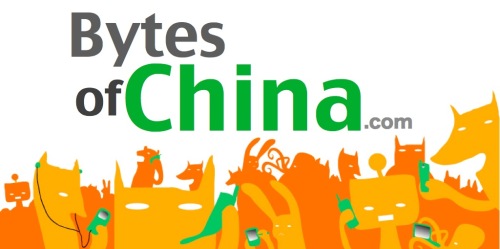Bytes of China! A new blog on the ethnographic analysis of China's digital youth culture

Welcome to my primary blogging home for the next year! I'll be sharing insights from my next year of research on how non-elite youth are using digital tools and interacting with the physical city through these tools. Instead of waiting to read my book or hearing a talk, I'll be giving you small bytes of my fieldwork several times a week for the next year from pictures of my daily travels to quotes from interviews and previews from my field notes.
I believe in practicing holistic ethnography so when I document digital practices, I document as many aspects of life as possible even if there is no obvious connection to the digital. Sometimes, a participant's pencil that they carry in their purse can tell you more about their communication practices than their cellphone.
Some themes that I will be blogging about:
Third places
Digital computing is changing the way people interact with physical spaces and the city. This in turns changes the way people maintain social connections. In my work, I argue that private spaces of information access, such as Internet cafes, are the new third places for non-elite users. They point to a new kind of hybrid geography of the physical and virtual worlds, where emerging practices are constantly in flux. I am fundamentally interested in how the convergence and mixed use of digital tools from cellphones to the Internet is transforming communication practices and how it is introducing new opportunities and constraints for youth and migrants in the cities.
The emerging middle-class
Serving the social needs of migrants becomes more important as they secure a position in the middle-class. For China to sustain its urban growth and its entire population, it has to bring millions of migrants into the cities and into the middle class, ensuring that the urban household income continues to grow. Essentially, to accomplish this, China is digitally networking the consumption desires of millions of migrants who are aspiring to live the lifestyle of the middle class. People are using cellphones and Internet cafes to create the middle class/elite identity they desire. They achieve this through the digital content that they consume, the online games that they play, the clothes that they buy, and the choices they make in their online identities. This is a process that I call Digital Urbanism, on the margins where millions of rural-urban migrants are becoming urbanized through low-cost digital tools.
Migrant hopes and dreams
Understanding the hopes and dreams of migrants living on the margins of the city are central to my work. It is their hopes and dreams that are driving the Chinese economy, and a significant portion of the global economy. Their dreams for upward class mobility inform the kind of consumption activities they decide to engage in, from playing online games to downloading music and buying clothes. Migrants are becoming urbanized through a culture of consumption that is mediated and intensified through digital tools.
New digitally mediated inequalities?
My passion is to understand the new kinds of inequalities that arrive with a mobile lifestyle that increasingly relies on digital tools. I am fundamentally interested in how this question applies for non-elite users. One of the stories of the digital revolution is that some of the most marginalized and poorest people are now actively incorporating digital tools into their lives. As this becomes a more familiar story around the world, new forms of inequality will arise. How do we rethink what inequality means in era where everyone has basic access to digital tools? How are marginalized users creating coherence with digital tools? What are the consequences when an entire stratum of society realizes connections through digital tools to many other stratums that were once impossible to reach? We need to become attentive to these new forms, so that content producers, designers, and programmers can meaningfully interact with non-Western and nontraditional ways of thinking and practices.
In addition to these broad topics, I will be looking closely at games, virtual economy, the relationship between mobile devices and internet cafes, instant message across multiple devices, youth's relationship to their hometown, construction of identity, use of social networks sites, media consumption (particularly tv, movies, dvds), and youth culture.
***
I was going to name this China Bytes, a la my other site Cultural Bytes, but then I realized that people could interpret it as China Bites as if it means China sucks. So that's how I arrived at Bytes of China!